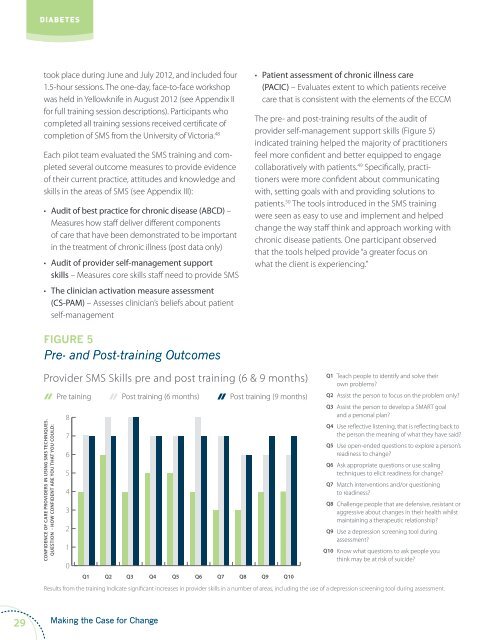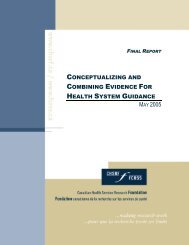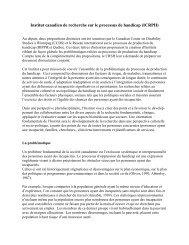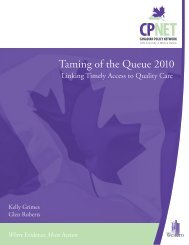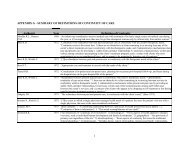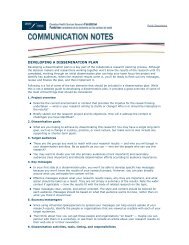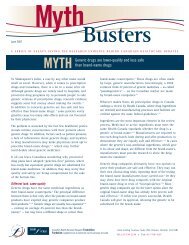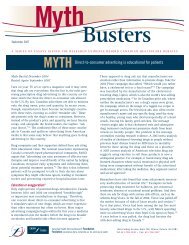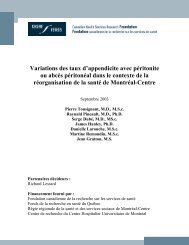Full Report
Full Report
Full Report
You also want an ePaper? Increase the reach of your titles
YUMPU automatically turns print PDFs into web optimized ePapers that Google loves.
DIABETES<br />
took place during June and July 2012, and included four<br />
1.5-hour sessions. The one-day, face-to-face workshop<br />
was held in Yellowknife in August 2012 (see Appendix II<br />
for full training session descriptions). Participants who<br />
completed all training sessions received certificate of<br />
completion of SMS from the University of Victoria. 48<br />
Each pilot team evaluated the SMS training and completed<br />
several outcome measures to provide evidence<br />
of their current practice, attitudes and knowledge and<br />
skills in the areas of SMS (see Appendix III):<br />
• Audit of best practice for chronic disease (ABCD) –<br />
Measures how staff deliver different components<br />
of care that have been demonstrated to be important<br />
in the treatment of chronic illness (post data only)<br />
• Audit of provider self-management support<br />
skills – Measures core skills staff need to provide SMS<br />
• The clinician activation measure assessment<br />
(CS-PAM) – Assesses clinician’s beliefs about patient<br />
self-management<br />
• Patient assessment of chronic illness care<br />
(PACIC) – Evaluates extent to which patients receive<br />
care that is consistent with the elements of the ECCM<br />
The pre- and post-training results of the audit of<br />
provider self-management support skills (Figure 5)<br />
indicated training helped the majority of practitioners<br />
feel more confident and better equipped to engage<br />
collaboratively with patients. 49 Specifically, practitioners<br />
were more confident about communicating<br />
with, setting goals with and providing solutions to<br />
patients. 50 The tools introduced in the SMS training<br />
were seen as easy to use and implement and helped<br />
change the way staff think and approach working with<br />
chronic disease patients. One participant observed<br />
that the tools helped provide “a greater focus on<br />
what the client is experiencing.”<br />
Figure 5<br />
Pre- and Post-training Outcomes<br />
Provider SMS Skills pre and post training (6 & 9 months)<br />
Confidence of care providers in using SMS techniques.<br />
Question - How Confident are you that you could:<br />
Pre taining<br />
8<br />
7<br />
6<br />
5<br />
4<br />
3<br />
2<br />
1<br />
0<br />
Post training (6 months)<br />
Post training (9 months)<br />
Q1 Q2 Q3 Q4 Q5 Q6 Q7 Q8 Q9 Q10<br />
Teach people to identify and solve their<br />
own problems?<br />
Assist the person to focus on the problem only?<br />
Assist the person to develop a SMART goal<br />
and a personal plan?<br />
Use reflective listening, that is reflecting back to<br />
the person the meaning of what they have said?<br />
Use open-ended questions to explore a person’s<br />
readiness to change?<br />
Ask appropriate questions or use scaling<br />
techniques to elicit readiness for change?<br />
Match interventions and/or questioning<br />
to readiness?<br />
Challenge people that are defensive, resistant or<br />
aggressive about changes in their health whilst<br />
maintaining a therapeutic relationship?<br />
Use a depression screening tool during<br />
assessment?<br />
Know what questions to ask people you<br />
think may be at risk of suicide?<br />
Results from the training indicate significant increases in provider skills in a number of areas, including the use of a depression screening tool during assessment.<br />
Q1<br />
Q2<br />
Q3<br />
Q4<br />
Q5<br />
Q6<br />
Q7<br />
Q8<br />
Q9<br />
Q10<br />
29<br />
Making the Case for Change


